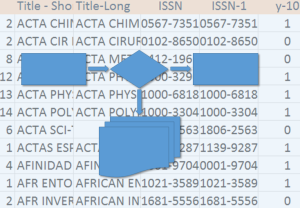By Abel L. Packer
 The journals of Brazil are advancing significantly in the improvement of the professional management and operation of the processes of editing, publishing, dissemination and marketing, all without diminishing their academic nature.
The journals of Brazil are advancing significantly in the improvement of the professional management and operation of the processes of editing, publishing, dissemination and marketing, all without diminishing their academic nature.
Taking the set of all SciELO journals, we highlight, as indicators or characteristics of these advances, the up-to-date publishing of new issues without delay and the adoption of advanced publication of articles prior to assembling the individual issues, the increasing use of social networks for the dissemination and marketing of research, and the adoption of innovations in the publishing processes.
These advances are inline with the promotion of the professionalization of the journals that the SciELO Program has been prioritizing at the same time as internationalization and the search for stable financial sustainability as necessary conditions for the continued enhancement of the credibility, visibility, presence, influence and impact of research published by the journals of Brazil. These advances contribute decisively to the improvement of the quality of scholarly communication in Brazil, and their routine practice is being integrated into the new SciELO Brazil Collection indexing criteria, both for the admission of new journals and to the retention of those already indexed.
In this context, a consensus is gradually forming in the research community that the journals of Brazil play a key role in communicating close to 30% of the national research indexed internationally, and that their improvement is essential to the improvement of the general performance of scientific research in Brazil. Professionalization is part of this improvement process.
Professionalization is understood here as the production of journals according to the international state of the art and comprises an informed management and operation with a set of characteristics and conditions that contribute to minimizing the time and maximizing the transparency of the process of the evaluation of submissions, the editing of the texts to correct errors, making for easier reading and adherence to international norms of communication in the different subject areas and in different languages, the formatting of texts in XML as the source for generating versions in PDF, ePUB and HTML, the exploitation of mechanisms and services of interoperability for journals and articles on the Web, and the dissemination of new research on social networks.
The professionalization of the management and operations does not mean abandoning the nature and academic focus which characterize the publication of journals in Brazil. However, this condition implies specific challenges.The principal one relates to the fact that the majority of Editors-in-Chief and associate editors are active researchers that dedicate a small portion of their time to the management of journals. This is valuable time and it is recommended that it be preferably dedicated to two principal functions: development of the editorial policy of the journal and the management of the evaluation of submissions. The full implementation of these functions, in particular the evaluation of submissions, requires the active engagement of associate editors. In other words, the structure and composition of the editorial board should be geared to the division of responsibilities. The use of online submission management systems makes feasible this shared and decentralized management with associate editors in the different cities in Brazil and abroad. The main management challenge is to ensure that the understanding and implementation of editorial policies is as uniform as possible, particularly in the evaluation of submissions.
The second challenge concerns the efficient adoption of methodologies and technologies for the production of the texts, the preparation of the issues and publication online and, in some cases, also in print. This challenge can be addressed by three approaches: The first is to perform all the editorial production with in-house teams and resources, be they of the journals themselves or shared with other journals of the same institution; the second is to combine in-house teams and resources with the contracting of external services having, in general, the rational use of financial resources as a criterion and; the third approach is to contract the entire production to external services. The SciELO Program has been promoting the establishment of a common platform of editorial and publication services provided by national and international companies certified by the Program. For each type of service, the view is to have at least three companies over the next two years. The certification process has, as its criteria, adherence to the norms adopted by SciELO in indexing, publishing and interoperability, thus gradually moving the production of journals towards the international state of the art. Journals with in-house production should follow the same standards.
In addition to indexing and publishing online, SciELO is responsible for maximizing the interoperability of journals and articles, providing them with protocols that facilitate the interchange with and access by indexes, systems and bibliographic services, and by the different search engines.
The professionalization of dissemination and marketing has maximizing the presence of the journals and articles on social networks as its priority. The view is that the journals complement their email lists of researchers and users with interactive spaces in Twitter, Facebook, Mendeley, ResearchNet, academia.edu and so on. SciELO is promoting the blog SciELO in Perspective as a collective solution, whose posts in the form of press releases, interviews and analyses are provided by the journals.
Besides the improvement and streamlining of processes, professionalization also aims to improve the ratio of cost to quality.
Translated from the original in Portuguese by Nicholas Cop Consulting.
Como citar este post [ISO 690/2010]:












Read comment in Portuguese, by Gustavo Biscaia de Lacerda: http://blog.scielo.org/blog/2014/06/16/os-desafios-da-profissionalizacao/#comment-1605